Sixty Years of Mission and Grace
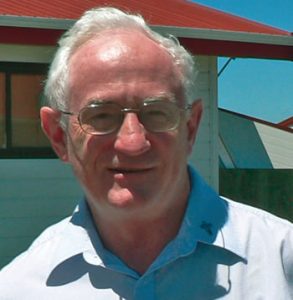
by Fr Neil Vaney SM
A Brief History of the Catholic Enquiry Centre
Part 1 of 2
Origins and Mission
Though the Catholic Missionary Society in England had expounded and defended the Catholic Faith for nearly a century, a more dynamic approach came to birth in the 1950s. It embodied a move from quiet survival to proclamation, or as later parlance would express it, from maintenance to mission. From the outset it had three clear goals: to dispel non-Catholic prejudices against the Church; to create a ‘conversion consciousness’ among Catholics; and to arouse enough interest among potential converts for them to approach a priest in a parish to explore this budding interest- in short, evangelisation.
This new emphasis reached New Zealand shores by means of a visit from Frs Dwyer and Holland in 1957, preaching a series of parish missions and retreats. Their central call was for all Catholics to reach out and bring others to faith. In response, the New Zealand bishops sent Frs Maurice Ryan and Brian Ashby to London to become familiar with this new emphasis and its methods. Back in New Zealand, the Catholic Enquiry Centre was launched at a national meeting at Holy Cross seminary in Dunedin on 14 September 1960 and it began operating in Wellington in February of the next year.
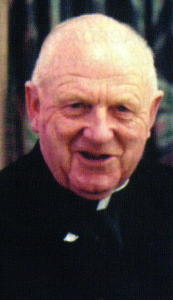
Msgr Maurice Ryan Director 1960-1988
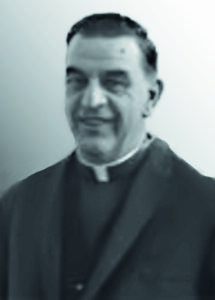
Fr Brian Ashby
Co-Director 1960-64
The structure of the new movement was to be relatively simple, made up of office staff and director(s) in Wellington working hand-in-hand with sponsors and donors throughout the nation. Sponsors were to pray daily for new Catholics and to make an annual donation. As numbers grew, promoters were added; their responsibility was to distribute newsletters and collect donations from groups of ten donors. Later, as the use of credit cards and direct banking systems become more common, more and more members made their contribution by becoming direct donor supporters.
The Directors
Like most growing movements, the CEC needed a stable leadership to promote its vision through appropriate methods and planning. It would be the task of the directors to maintain the original vision and spirit and to communicate this to its workers in the field i.e. the donors and promoters, by way of newsletters, letters and visits, and later on by increasing use of computers and e-mail. As inquiries grew and new emphases in Catholic teaching appeared after the Second Vatican Council (1961-65), it became necessary to include as part of the staff people skilled in theology and pastoral practice, normally a priest for the first thirty years of the office.
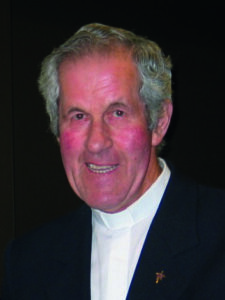
Fr Paul Shannahan SM Director
1988-2006
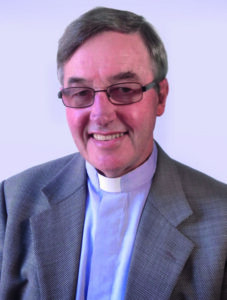
Fr Allan Jones SM Director 2006-17
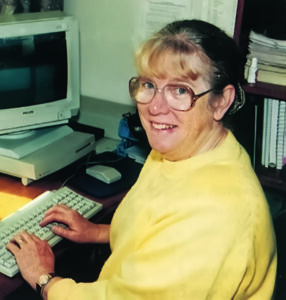
Srs\ Merle Hiscock RNDM
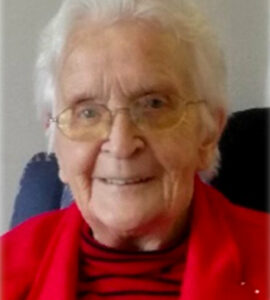
Sr Rosalie Jane Kuklinski RNDM
Directors, Co-Directors and
Directors of Studies - Past and Present
Frs Maurice Ryan, Brian Ashby, Thomas Williams, Maurice Flanagan SM, Francis Rasmussen SM, Paul Shannahan SM, Dennis Scully SM, Srs Merle Hiscock RNDM, Margaret Cross SM, Jane Kuklinski RNDM, Frs Allan Jones SM and Neil Vaney SM (pastoral director/chaplain)
Fr Paul Shannahan had just completed a three year stint as leader of the ‘Renew’ process in New Zealand when he was approached by Bishop Gaines of the Hamilton diocese and offered the job of the director of the CEC as Fr Maurice Ryan was preparing to step down after 28 years at the helm. Initially, the offer was for a three-year contract, which eventually blossomed out to eighteen. He came with a new emphasis on the role of the laity and their work in sharing, praying and living the faith, especially in parish settings. These goals were to be achieved by lively advertising in papers and magazines (later by radio and television), direct work with parishes, and helping promoters to see themselves as shareholders and fundraisers in this business.
His first task was to revitalise the office, replacing the Olivetti typewriters with Xerox and fax machines. He crafted a review with the help of thirty local Catholic leaders and the expert help of Frs Michael Mullins and Gerry Arbuckle from the Refounding and Pastoral Development Unit in Hunters Hill, Sydney, as facilitators. This led to the setting up of advisory groups. He himself was to take a sabbatical at the Institute of Pastoral Studies in Chicago in November 1989.
At the same time Fr John Weir SM was working on the ten booklets that were to form the ‘What Catholics Believe’ set that was to be the staple informational base for inquirers for nearly thirty years. At this stage the CEC counted 600 promoters and 14,000 supporters on its books.
Fr Allan Jones took over in June 2006. He mentions that when he began he was very deeply aware of the strong currents of secularism and agnosticism running through our society, so saw his task, like Jesus, as one of sowing seeds. “I was conscious that the tone of CEC’s message on TV, radio, online and in print needed to assure prospective enquirers that they wouldn’t be hassled.” He wanted them to know that they could chat to him at any time by phone or e-mail – and this led to many fruitful relationships. He also realised that Jesus was the true treasure that people were seeking and that it was the work of the Holy Spirit that brought them to Christ – not his insights or effort.
He continued the work of advertising, visiting parishes and religious groups and for his personal enrichment went on pilgrimage to Poland and Hungary, visiting Auschwitz on the way to a six day congress on the New Evangelisation in Budapest. He also took a sabbatical in 2011, soaking in the thoughts of writers such as Flannery O’Connor, who had been able to communicate the essential Christian message in a very different world.
In Autumn 2016 it was announced that Fr Allan would be standing down and Gerard Scanlan, as Board chairman, signalled that the bishops were intent on moving to a new structure, employing a business manager and a priest chaplain. The background to these changes was the changing face of Catholic parishes in New Zealand. Many of the original promoters and sponsors of CEC were ageing and moving into retirement homes; an increasing number of newsletters were being returned with the notice, ‘addressee deceased.’ Numbers of young and middle aged people in parishes were in decline, and dioceses were working to attract youth in quite different ways, as many of them no longer watched TV or read papers much, shaping their world by phone or tablet, sharing the digital world with their friends.
It was in this context that Fr Neil Vaney SM was taken on as priest/chaplain. His background was academic, having been a lecturer in moral theology, also a published writer, but with a strong commitment to working with young people in spiritual direction and formation.

What Catholics Believe Booklets
The search for a full-time director proved difficult, so David Mullin, who had been a member of the last Board of Governors, was asked to act as director till March 2017. Such was the background that led to the solution of hiring Fr Neil as pastoral director and Joe Serci as engagement manager. Joe came out of a strong background of planning and recruitment in the digital and training world. Both he and Fr Neil would be employed part-time, while Mely Kartawidjaya, with her wide range of computer and business management skills, was taken on as officer manager.
It was clear that such a structure would mean a considerable loss in terms of personal and parish contact but that the new mix of computer and business skills would find new ways of reaching Catholics who had wandered from their faith commitments, and the secularised and digital-focused world of many younger New Zealanders.
The Office Staff
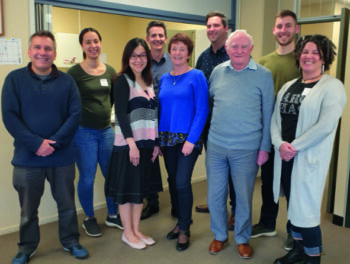
Present CEC Staff and Advisory Committee
Office Staff - Past and Present
Phyllis Penfold, Frances Duignan, Sr Mary Critchley RSM, Adele Visala, Jan Tuinman, Lynne Jagusch (Director’s Assistant), Natalie Little, Moira Christenhusz, Sr Mary Rea RSM (Archives), Sr Jane Kuklinski RNDM, Lorna Zarate and Mely Kartawidjaya --as well as hundreds of volunteers, too numerous to mention
Sadly, we have very little in the way of records and reminiscences of most of these dedicated men and women, notably up to about 1990. On the other hand, we are fortunate to have personal accounts from two previous directors, Frs Paul Shannahan SM (1988-2006) and Allan Jones SM (2006-15) and the present director, Neil Vaney SM. Between them we can gain glimpses of the changing face of the Catholic Church and New Zealand society from the late 1980’s till today.
Newsletters from the 1980’s and 1990’s show pictures of up to ten volunteers and office staff stuffing letters into envelopes, ready to be despatched all over New Zealand. We who now work at CEC know that the legacy we have inherited of a devoted following and sound financial base is largely due to the efforts of these men and women. As contacts and information have become more and more digital, the role of our office staff has changed too. For instance, Mely, who was originally contracted for specific projects in 2014, became receptionist and administrator in 2015. When she decided to apply for the new role of office manager in 2017, this meant that the roles of Lorna Zarate as finance officer and Moira Christenhusz as database operator, both of whom had given sterling service, then disappeared. Both of these deeply committed women were given much help to find other employment but we were very sad to see them depart.
 Entries(RSS)
Entries(RSS)